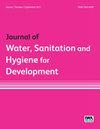印度尼西亚农村家庭饮用水处理:实际做法、决定因素和饮用水质量
IF 1.4
4区 环境科学与生态学
Q3 WATER RESOURCES
Journal of Water Sanitation and Hygiene for Development
Pub Date : 2023-02-22
DOI:10.2166/washdev.2023.215
引用次数: 0
摘要
家庭水处理(HWT)是为无法获得安全饮用水供应的家庭提供的解决方案。在印度尼西亚努沙登加拉帖木儿省恩德区进行了一项横断面研究。共有425名家庭受访者接受了采访,并观察了HWT实践和蓄水条件,收集了143份家庭饮用水样本进行微生物水质分析。结果表明,尽管HWT是定期进行的,但并不是他们喝的所有水都经过了处理。心理因素风险、态度、规范、能力和自我调节(RANAS)的“水平”较高,表明常规HWT实践与潜在的心理因素密切相关。心理因素行动计划是与饮用处理水频率相关的最具影响力的心理子因素。饮用水大多储存在安全的地方,但放置在不太卫生的周围环境中。尽管HWT可以改善水质,但水质与HWT、饮用水处理或储存没有显著关系。最后,在HWT普遍使用的地区,仍然需要提倡始终饮用经过处理的水,然后将其储存在安全卫生的环境中,这样人们才能获得HWT对健康的最大影响。本文章由计算机程序翻译,如有差异,请以英文原文为准。
Household drinking water treatment in rural Indonesia: actual practice, determinants, and drinking water quality
Household water treatment (HWT) is a solution for households that do not have access to a safe drinking water supply. A cross-sectional study was conducted in Ende District, Province of Nusa Tenggara Timur (NTT), Indonesia. A total of 425 household respondents were interviewed and observed about the HWT practice and water storage condition and 143 household drinking water samples were collected for microbial water quality analysis. Results show that even though HWT is regularly performed, not all the water they drink has been treated. The ‘level’ of psychological factors risk, attitude, norms, ability, and self-regulation (RANAS) were high, indicating that regular HWT practice goes in hand with the underlying psychological factors. Psychological factor action planning was the most influential psychological sub-factor associated related with the frequency of drinking treated water. Drinking water is mostly stored in safe storage, but placed in a less hygienic surrounding environment. Though HWT results in better water quality, water quality was not significantly associated with HWT, drinking water handling, or storage. Finally, promoting always drinking treated water and then storing it in a safe and hygienic environment are still needed in areas where HWT is commonly practiced, so people can get the maximum health impact of HWT.
求助全文
通过发布文献求助,成功后即可免费获取论文全文。
去求助
来源期刊

Journal of Water Sanitation and Hygiene for Development
WATER RESOURCES-
CiteScore
3.10
自引率
11.80%
发文量
58
审稿时长
16 weeks
期刊介绍:
The Journal of Water, Sanitation and Hygiene for Development is a peer-reviewed journal devoted to the dissemination of high-quality information on the science, policy and practice of drinking-water supply, sanitation and hygiene at local, national and international levels.
 求助内容:
求助内容: 应助结果提醒方式:
应助结果提醒方式:


